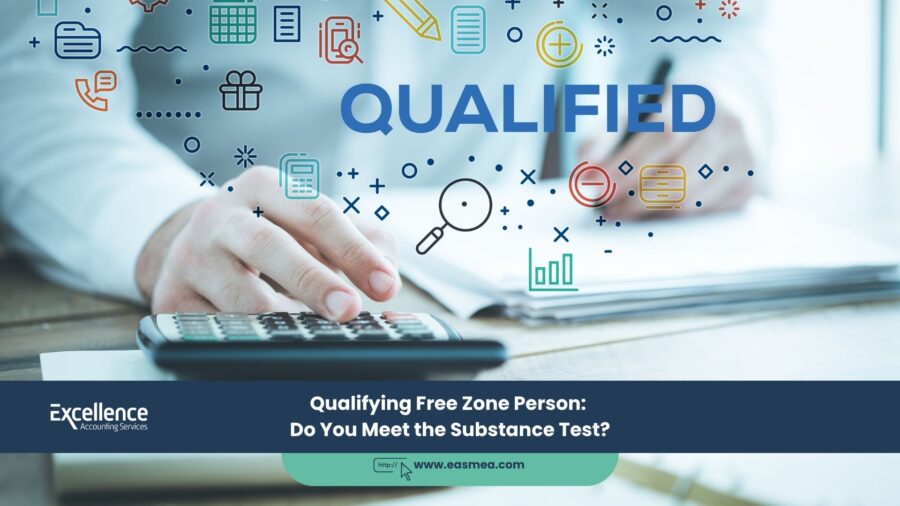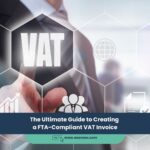Qualifying Free Zone Person: Do You Meet the Substance Test?
The introduction of UAE Corporate Tax brought a paradigm shift, but one of its most attractive features remains the preferential 0% tax rate for businesses operating in the nation’s vibrant Free Zones. This incentive is designed to uphold the UAE’s status as a leading global business hub. However, this coveted 0% rate is not automatic. It is a privilege reserved for businesses that can prove they are not just “paper companies” but are genuine, active operations contributing to the economy. This proof is established by meeting the strict criteria to be classified as a Qualifying Free Zone Person (QFZP).
- Qualifying Free Zone Person: Do You Meet the Substance Test?
- Defining a Qualifying Free Zone Person (QFZP)
- The Substance Test: Proving Your Economic Presence
- The Critical Distinction: Qualifying vs. Non-Qualifying Income
- The High Stakes: What Happens if You Fail the Test?
- Ensure Your Substance with Excellence Accounting Services (EAS)
- Frequently Asked Questions (FAQs)
- Is Your Business Substantial Enough?
At the heart of the QFZP status lies a critical concept: adequate substance. This test requires a Free Zone company to demonstrate that it has a real economic presence within the zone. It’s a measure designed to ensure that only businesses with legitimate operations—with real employees, real assets, and real activities—benefit from the 0% tax rate. For any Free Zone business owner, understanding and meeting the substance test is not just a compliance exercise; it is the fundamental key to unlocking the most significant tax benefit available in the UAE.
This guide will provide a deep dive into the substance requirements for a Qualifying Free Zone Person. We will dissect what “adequate substance” truly means, explain the Core Income-Generating Activities (CIGAs) you must conduct, and clarify the high stakes of failure. For any Free Zone entity, this is essential reading to secure your tax position and plan for a compliant, prosperous future.
Key Takeaways
- 0% Tax is Conditional: The 0% Corporate Tax rate is only for businesses that meet all the conditions of a Qualifying Free Zone Person (QFZP).
- Substance is Non-Negotiable: A QFZP must maintain “adequate substance” in the Free Zone, meaning it has sufficient employees, assets, and expenditures relative to its activities.
- Core Activities Matter: The company’s Core Income-Generating Activities (CIGAs) must be performed within the Free Zone.
- Qualifying Income is Key: The 0% rate primarily applies to “Qualifying Income,” such as income from other Free Zone entities or from exports.
- Failure is Costly: Failing to meet the QFZP conditions results in losing the 0% tax benefit on ALL income for a minimum of five years.
- Professional Assessment is Vital: A thorough assessment by a tax advisor is crucial to confirm your QFZP status and ensure compliance.
Defining a Qualifying Free Zone Person (QFZP)
According to the UAE Corporate Tax Law, a Free Zone Person that meets all the following conditions is considered a QFZP and can benefit from the 0% tax rate on its Qualifying Income:
- Maintains Adequate Substance: The business must have a genuine economic presence in the Free Zone.
- Derives Qualifying Income: The income earned by the business must meet the definition of “Qualifying Income” as set out in the law.
- Has Not Elected to be Taxed at 9%: The business has not chosen to give up its QFZP status and be subject to the standard Corporate Tax rate.
- Complies with Transfer Pricing Rules: All transactions with related parties must be conducted at arm’s length and documented according to transfer pricing regulations.
- Maintains Audited Financial Statements: The company’s financial records must be audited and prepared in accordance with internationally accepted standards.
While all these conditions are mandatory, the most nuanced and scrutinized among them is the requirement to maintain adequate substance.
The Substance Test: Proving Your Economic Presence
The substance test is designed to prevent tax avoidance by ensuring that a company’s profits are taxed in the jurisdiction where the real economic activity generating those profits occurs. It has two fundamental pillars.
Pillar 1: Core Income-Generating Activities (CIGAs)
A QFZP must conduct its most important, value-creating activities from within the Free Zone. These are not ancillary tasks like bookkeeping or HR; they are the fundamental operations that drive the business. The nature of CIGAs varies by industry:
- For a Distribution Business: CIGAs would include procurement of goods, inventory management, order processing, and logistics.
- For a Service Provider: CIGAs would involve consulting with clients, developing service proposals, and executing the service delivery.
- For a Software Company: CIGAs would be software development, coding, testing, and maintenance.
Simply having a registered office in a Free Zone while the main work is done elsewhere will not satisfy this condition. The strategic decisions and principal activities must be based in the zone.
Pillar 2: Adequate Assets, Employees, and Expenditures
This is the quantitative aspect of the substance test. A QFZP must have sufficient tangible and intangible assets, an adequate number of qualified full-time employees, and incur sufficient operating expenditures within the Free Zone. Crucially, “adequate” is not a fixed number. It is assessed relative to the nature and scale of the business.
An IT consultancy with five high-value clients might only need a small office and three highly skilled employees to have “adequate” substance. In contrast, a large-scale manufacturing plant would need a factory, heavy machinery, and hundreds of employees to be considered to have adequate substance. The test is one of proportionality.
| Business Type | Example CIGAs (in Free Zone) | Example of Adequate Substance |
|---|---|---|
| Trading Company | Sourcing suppliers, negotiating contracts, managing logistics, sales & marketing. | Warehouse/storage facility, office space, qualified purchasing and sales staff, inventory management systems. |
| Management Consultancy | Client meetings, strategic analysis, report preparation, project management. | Professional office, experienced consultants, industry research subscriptions, IT infrastructure. |
| Holding Company | Holding and managing equity participations, making strategic decisions on acquisitions/disposals. | Office space, qualified directors/staff to manage the investments, board meeting records in the UAE. |
The Critical Distinction: Qualifying vs. Non-Qualifying Income
The 0% tax rate for a QFZP applies only to its “Qualifying Income.” Understanding this distinction is vital.
- Qualifying Income generally includes:
- Income from transactions with other Free Zone Persons.
- Income from transactions with businesses located outside the UAE (exports).
- Passive income like interest and royalties, provided it meets certain conditions.
- Non-Qualifying Income generally includes:
- Income from sales to mainland UAE customers (unless it’s for distribution purposes where the customer is the importer of record).
- Income from certain activities like banking, insurance, and specific types of real estate transactions.
A QFZP can have a small amount of non-qualifying income without losing its status, thanks to the de minimis requirement. If the non-qualifying revenue is less than 5% of total revenue or AED 5 million (whichever is lower), the company can maintain its QFZP status. However, that non-qualifying income itself will be taxed at 9%.
The High Stakes: What Happens if You Fail the Test?
The consequences of failing to meet any of the QFZP conditions, including the substance test, are severe. A company that fails will lose its QFZP status. This means:
The company’s ENTIRE taxable income for that year and the subsequent FOUR years will be subject to the standard 9% Corporate Tax rate.
This is not a minor penalty. It’s a five-year disqualification from the 0% tax regime. This makes proactive compliance and regular assessment of your substance not just important, but business-critical.
Ensure Your Substance with Excellence Accounting Services (EAS)
Navigating the nuances of the substance test and QFZP requirements demands expert guidance. At EAS, we provide specialized services to help Free Zone businesses secure their 0% tax status.
Our Services for Free Zone Companies:
- Corporate Tax Health Check: We conduct a comprehensive review of your operations to assess your QFZP status, identify any substance gaps, and provide a clear roadmap for compliance.
- Structuring and Advisory: We help you structure your operations and transactions to align with QFZP requirements and maximize your tax efficiency.
- Company Formation and Restructuring: For new businesses, we ensure your company formation is optimized for QFZP status from day one.
- Compliant Accounting: We maintain your books and records in a way that clearly documents your substance and segregates your income streams, ready for audit.
Frequently Asked Questions (FAQs)
While conceptually similar (both aim to ensure real economic activity), they are distinct legal requirements. ESR was a standalone regulation with its own reporting portal. The substance requirement is now integrated directly into the Corporate Tax Law as a condition for being a QFZP. The core principles of having adequate employees, assets, and CIGAs remain, but they are now assessed within the context of the Corporate Tax regime.
Yes, but with caution. You can outsource activities, but you must be able to demonstrate that you have full control and supervision over these outsourced functions. The activities must be performed for your business and on your behalf within the Free Zone. Simply paying a service provider is not enough; you must be able to show operational control. The number of your own full-time employees is still a key indicator.
Assets can include office space, warehouses, machinery, IT equipment, and intellectual property. You do not necessarily have to own them. A long-term lease for an office or warehouse can also demonstrate substance. The key is that you have the right to use these assets for your core activities and that their scale is appropriate for your business.
The de minimis test compares your non-qualifying revenue to your total revenue for a given tax period. You calculate your total non-qualifying revenue and check if it is below two thresholds: 1) 5% of your total revenue, AND 2) AED 5 million. If it is below the lower of these two amounts, you pass the de minimis test.
This is a high-risk area. The Corporate Tax Law requires that the Core Income-Generating Activities are performed in a Free Zone. If a significant part of your CIGAs is conducted outside the zone (e.g., on the mainland or in another country), you risk failing the substance test and losing your QFZP status. It’s crucial that the strategic and operational heart of the business resides within the zone.
Under the Corporate Tax regime, you will be required to declare that you meet the QFZP conditions as part of your annual Corporate Tax return. While it’s not a separate filing like the old ESR portal, the requirement to self-assess and document your substance is now an integral part of your tax filing obligation.
Yes, a pure holding company can be a QFZP. Its Core Income-Generating Activity is holding and managing its equity participations. To meet the substance test, it would need to have, for example, a physical office, qualified directors or employees who actively manage the investment portfolio, and records of board meetings where strategic decisions are made, all located within the Free Zone.
You need comprehensive documentation, including: employee records (contracts, visa copies, payroll from a service like our payroll services), lease agreements for offices/warehouses, asset registers, detailed timesheets for key employees showing their activities, and minutes of board meetings held in the UAE where strategic decisions were made.
The Free Zone Authorities play a role in licensing and ensuring businesses comply with their specific regulations. However, the ultimate authority for assessing substance for Corporate Tax purposes is the Federal Tax Authority (FTA). The FTA will make the final determination of whether a company meets the QFZP conditions during a tax audit.
No, not immediately. The penalty for failing to meet the QFZP conditions is a disqualification for a period of five years, starting from the tax period in which the failure occurred. This means you would be subject to the 9% tax rate on all your income for that year and the next four years. This makes proactive, continuous compliance absolutely essential.
Conclusion: Substance is the Bedrock of Your 0% Tax Status
The status of a Qualifying Free Zone Person is the most valuable tax position a UAE business can hold. But it is a privilege that must be earned and continuously maintained through a genuine and demonstrable economic presence. The substance test is not a loophole to be navigated but a standard to be met.
By proactively assessing your operations, ensuring your core activities are grounded in your Free Zone, and maintaining meticulous records, you can confidently secure your QFZP status. This strategic approach to compliance is the bedrock upon which a tax-efficient and sustainable business is built in the UAE.
Is Your Business Substantial Enough?
Our expert tax advisors can help you identify any gaps in your substance and create a clear plan for compliance.




